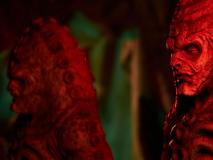 The BBC
The BBC have announced the
winners of the
Big Finish Short Story Contest. Michael Coen's
What I Did On My Holidays has won the competition, aimed at previously unpublished new writers. The story - which features the second Doctor and his friends Jamie and Zoe - will be published in the
Defining Patternsanthology in September of this year.
Norman's homework worries his teacher. Instead of a trip to the beach or the zoo, it's about meeting a man from the future. Norman of course knows better than to talk to strange men, but this is his own grown-up self. Surely he can't mean any harm... Can he?"It's a lively, funny and strangely moving story," enthuses chief-judge Simon Guerrier. "Michael keeps you guessing all the way along. And, very importantly, he's really brings the second Doctor to life."
"To have actually won the competition is a huge surprise and an absolute delight," says Michael. "I can't wait to see my story in print and I'm also looking forward to reading the stories from other entrants, which I'm sure are equally deserving."
"We had an incredibly strong shortlist of the best 25 entries," explains Guerrier. "Defining Patterns will see Michael's story published alongside many established and well-known writers. But we felt our shortlist was of such quality that it deserved a whole book of its own."
This special anthology, deftly titled
How The Doctor Changed My Life, will be published in late 2008. The 24 runners up are:
Violet Addison; Steven Alexander; Mike Amberry; Arnold T Blumberg; Anna Bratton; John Callaghan; Dann Chinn; Stephen Dunn; Richard Goff; Peter Hallbright; Tim Lambert; JR Loflin; Nick May; James C McFetridge; Simon Moore; Michael Montoure; LM Myles; Einar Olgeirsson; Bernard O'Toole; Andrew K Purvis; Michael Rees; Mark Smith; Chris Wing; Caleb Woodbridge.
Simon Guerrier has provided Outpost Gallifrey with some general feedback for contest entrants, which can be viewed by clicking the
Spoiler link below, or viewed in our
forum.
What follows are some common things I saw in the more than 1,000 stories we received. They're not necessarily things that people got 'wrong', but pointers that (I hope) might improve your next piece of writing.
These notes will not cure baldness or veruccas. Reading them won't automatically get your Doctor Who stories published, nor will they magically transform you into a professional writer. That takes practice and perseverance (well, not the baldness and veruccas). If you really want to write, you've probably got more rejections to come - I'm still collecting them, anyway.
These notes aren't rules or laws of physics. Others might disagree with any or all of them. I probably ignore at least some of them in my own published Doctor Who stories. Remember: these are the irrational prejudices of one crabby old editor, too dim to see the shiny brilliance of your story.
You may even feel having read the notes that your story did everything right. That just means we preferred other stories over yours. I said we were dim.
Please don't send us a revised version of your story. Big Finish simply don't have the time to read them. We're a small company and we've only limited resources. I was employed as a freelancer to read the competition entries, and now I'm off to do other things.
I don't know whether we'll run another competition like this one. It's been a huge success, but also entailed a great deal of time and effort on our part. The final decision isn't up to me, though, and if something like this happens again, I think it is somebody else's turn to run it. If that's the case, there'll be announcements - so keep an eye on www.bigfinish.com.
Lastly, some recommended reading. The Writers and Artists' Handbook is a must for anyone serious about this sort of thing. I'd also recommend William Goldman's Which Lie Did I Tell? and Robert McKee's Story. They're both about writing screenplays but a lot of the advice applies generally. (I was recommended Story in a letter rejecting an idea for a Doctor Who novel.)
The Turkey City Lexicon will help you spot and eliminate science-fiction clichés in your writing. The BBC's writersroom is full of useful advice, too. And here at Outpost Gallifrey's Mythmakers forum you can compare your stories and swap feedback with other competition entrants. Right then...
1. Classic Doctors...
There were only a few of these, but we had to disqualify stories with the ninth or tenth Doctors, Daleks, Cybermen, Rose, Grace Holloway, psychic paper, the Time War, etc. We don't have a licence for these things. No matter how brilliant your story, if your story depended on any of these there was no way you could win.
(We can't even include references to these things either - but in most cases such mentionings could have been removed easily.)
2. ...Brand new adventures
Some stories depended too much on stuff from previous Doctor Who stories. Some were even direct sequels. Often, without these recycled continuity elements, there wouldn't have been any story.
3. The plotters
Some stories didn't have enough of a plot. Although a single conversation or moment can give insight into character, we still need a story to drive it. The Doctor and companion discuss their favourite movies: no. The Doctor and companion discuss their favourite movies while on the run from some robot monsters: yes!
Taking those last two points together, there was one plot we saw a lot of: the Doctor sees some children playing. When he then sees their mother, she's his granddaughter Susan. The end.
That's not so much a story as a scene. Much better if when he sees the children, they're being attacked by a monster and he has to save them.
No, wait - even better! He charges in to save these poor children but they don't need his help. These kids are brilliant, and the monster's fallen into their trap. In fact, they have to save the Doctor. He's a bit shaken by all this, so they take him home for tea. And that's when he sees who their mum is!
Same idea, but now it's a story. (What do you mean, "corny"?)
4. A family show
Like not using new series stuff, we're not able to publish stories which feature swearing, sex and/or gratuitous violence. You don't have to write specifically for children, but you shouldn't exclude them, either.
5. Did the Doctor change my life?
We needed to see people affected by their encounters with the Doctor. In some stories, events would have turned out more or less the same if the Doctor hadn't been involved. In other stories, the Doctor stopped a monster or brought down a dictator, but we didn't get an insight into how life was then different - usually because these stories weren't told from one person's point of view.
6. A strong central idea
A simple, clever premise helped to make the 25 stories on our shortlist stand out. They were each easily memorable as "the one with...". Some stories just felt a bit generic - the Doctor presses some buttons and so sees off a monster.
7. In the telling
With so many entries, it wasn't enough for your prose just to be okay. Your story had to engage us immediately, then keep us hooked right up to the end. That magic spell can be broken by clumsy grammar and punctuation, by overly long sentences (especially when it's the very first one!), by overwrought or clichéd imagery, and by using too many adjectives. Some stories felt as if the authors were trying too hard to impress us (and so failed to do so). Much better to keep things simple.
8. Oomf from the get-go
There's a difference between the suspense of waiting for something to happen, and getting bored waiting for anything to happen. Some stories felt like they were just setting up a single, climactic ending. One way out of this: start with your brilliant climax, and then work upwards from there.
9. Lists
Descriptions shouldn't hold up the telling. We don't need to know every detail of what someone's wearing or what objects are in a room. We just need enough of a glimpse to know where we are.
10. I am the Doctor
In some stories it was difficult to tell which Doctor was involved. Sometimes a Doctor would be physically described as, for example, the second Doctor, but would behave and sound like the sixth. This was also sometimes true of the companions.
11. Waving not drowning
Doctor Who doesn't have to be all sunshine and fluffy bunnies, but it is a fun and lively show and the Doctor's a funny bloke. A sense of humour can also give depth to a scary or downbeat story. The Doctor ruining people's lives and driving them to suicide doesn't really match the feel of the series.
12. In the frame
Some stories used interesting and innovative framing devices which helped to hook the reader, before the "real" story was told. Often, though, these "real" stories weren't nearly so interesting.
13. Research
Some stories got their continuity wrong, or told stories that had been done before in books or comics or audio plays. And most galling of all: one or two stories were too like forthcoming stories... Annoyingly, there's nothing you can do about that. I've done it many times myself.
 The BBC have announced the
The BBC have announced the 













